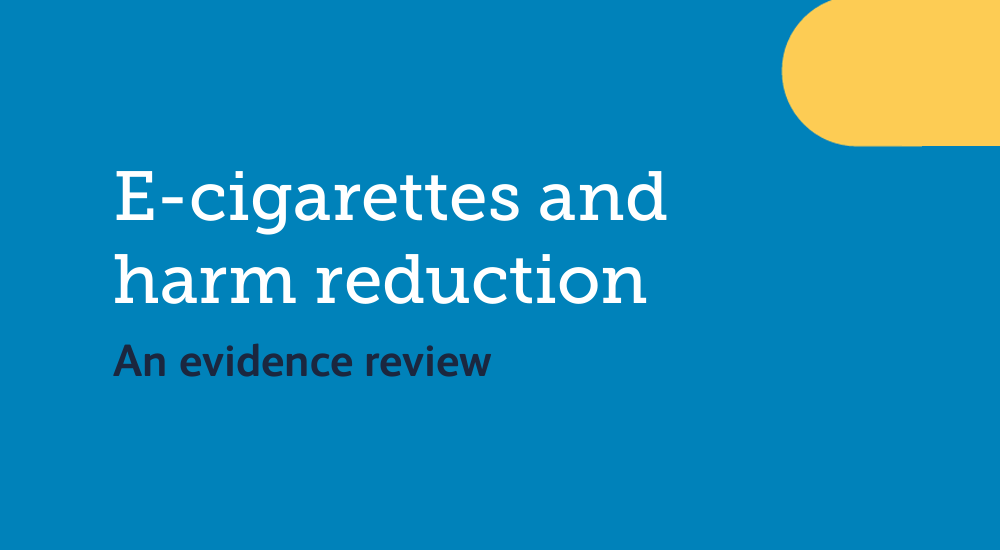SARG contributes to major new report on e-cigarettes

The Sheffield Addictions Research Group has contributed to a major new report on e-cigarettes from the Royal College of Physicians.
The report, 'E-cigarettes and harm reduction: An evidence review', explores several themes including how e-cigarettes can be used to support more people to make quit attempts while discouraging young people and never-smokers from taking up e-cigarettes.
SARG team members Alan Brennan, Duncan Gillespie, Damon Morris and Luke Wilson reviewed current models to assess the cost-effectiveness of using e-cigarettes for smoking cessation (section 4.7) and looked in depth at potential pricing policy options for e-cigarettes including for example reducing VAT on e-cigarette devices, introducing excise tax on disposable vapes and subsidising e-cigarettes for people accessing stop smoking support (section 6.3).
Their work contributes to wider debates about health and economic considerations around e-cigarette use and demonstrates how modelling can play an important role in understanding the benefits and drawbacks of different approaches.
This is the third report by the Royal College of Physicians that the Sheffield Addictions Research Group has been involved with. In 2018 we contributed to 'Hiding in plain sight: Treating tobacco dependency in the NHS' while in 2021 we provided content for 'Smoking and health 2021: A coming of age for tobacco control?'
Tobacco research at the University of Sheffield
The report comes during a period of rapid growth in tobacco research at the University of Sheffield.
We are collaborating with colleagues at University College London on a major project funded by Cancer Research UK to develop new detailed modelling of tobacco smoking and quitting behaviour, participating in a new 'Health Hub' consortium in which we will develop models of regional tobacco policy alongside other commercial determinants of health, and are developing bids to model new e-cigarette policy.
We are also evaluating new smoking cessation services in hospitals, funded by Yorkshire Cancer Research, and the government's 'Swap to Stop' e-cigarette scheme, as part of the Department of Health and Social Care's Policy Research Unit in Addictions.
Our modelling work was also instrumental in the development of the Tobacco and Vapes Bill which aims to create a 'smoke-free generation' and reduce the number of smoking related deaths.
Further reading
SYNTAX – 'Integrated evidence synthesis for joint appraisal of tobacco and alcohol tax interventions for harm reduction in the UK'. This project provided evidence and tools to inform the potential scale of effects of taxation across tobacco and alcohol as an intervention to improve public health and reduce health inequalities in the UK.
STAPM – 'The Sheffield Alcohol and Tobacco Policy Modelling Platform'. The aim of the STAPM research programme is to identify and evaluate approaches to reducing the harm from tobacco and alcohol, with the aim of improving commissioning in a public health policy context.
Tobacco and new nicotine product pricing policy: past, present and future (February 2024) An overview of Duncan Gillespie's talk at a SPECTRUM Consortium event exploring the potential impact of various pricing strategies on tobacco use and public health.
-
New research shows that spending less on tobacco, gambling and sweets is good for the UK economy
A new study from the Sheffield Addictions Research Group (SARG) has found that public health policies which reduce spending on harmful products can actually provide a significant boost to UK jobs and the wider economy.
-
SARG researcher Dr Parvati Perman-Howe secures NIHR Career Development Award
We are delighted to announce that Dr Parvati Perman-Howe, a Research Associate within the Sheffield Addictions Research Group (SARG), has secured a highly sought-after Career Development Award.
-
Professor John Holmes contributes to major new report outlining actions to tackle alcohol harm
SARG Director Professor John Holmes was part of an expert panel that supported the development of 'A Healthier Future: A long-term vision to tackle alcohol harm in the UK', a significant new report published by the Institute of Alcohol Studies (IAS) this week.
-
SARG researchers present on economic modelling and wastewater surveillance at European Public Health Conference
Two researchers from the Sheffield Addictions Research Group (SARG), Dr Charlotte Head and Dr Esther Chanakira, will showcase innovative local-level tools for policy design, including economic modelling and wastewater surveillance, at the European Public Health (EPH) Conference in Helsinki from 11–14 November 2025.
You might also be interested in…
-
Evaluation of the North Yorkshire County Council Living Well Smokefree Service
This mixed-methods evaluation explored the feasibility and acceptability of a hybrid smoking cessation service (one which offers remote, face-to-face and blended provision).
-
SARG work cited at Health and Social Care Committee inquiry
SARG work on the combined effects of tobacco and alcohol pricing policy was mentioned in the Health and Social Care Committee inquiry on tobacco, alcohol, gambling and drugs this week.
-
Choice and flexibility are key factors to support stopping smoking
An evaluation of a smoking cessation service by Sheffield researchers highlights the importance of flexible support to engage with different groups and support their individual needs.
